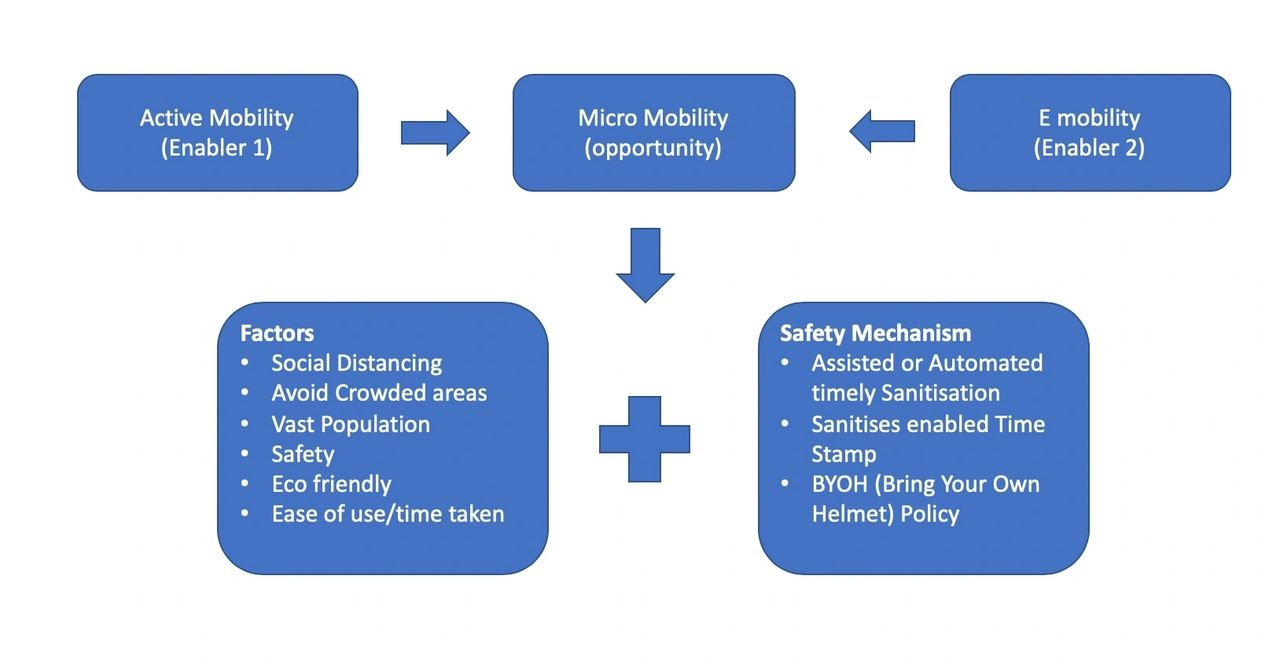Micro Mobility
Knowledge Share
New Normal, Digital Transformation, Industry 4.0
Trust | Transparency | Traceability
Micro Mobility

Multimodality is a form of transportation that is witnessing increasing adoption across markets, especially in semi-urban and urban areas that grapple generally with congestion and pollution-related issues.
The biggest opportunity for micro mobility in the near future is due to the fear of travel in public transportation. India is an underrepresented market for micro-mobility segment. The main opportunity in India is its amalgamation of different unique micro markets on economy, wealth, culture, income and livelihood. India is the largest two-wheeler marketing the world, and the millions of motorcycle and scooter riders have different navigation needs than drivers of automobiles, for easy reach in less time and better connectivity. For example, Google Maps in India’s first feature was the “two-wheeler mode” traffic navigator back in the year 2017.
Therefore, in the successive time period, people would be vouching for cycles, e-bikes, walking, and other solo commute options which could help to eradicate the fear of commute on multiple fronts. The Hub-To-Hub Model instead would ensure parking of bikes at designated spots; so only those needing a bike to come near a zone/station with assured sense of safety and precautions.

Market scenario-
The worldwide installed base of micro-mobility vehicles is forecast to reach 50 million by 2026 as its ability to dwell into a post-Covid-19 transportation landscape proves decisive in its comeback. According to ABI Research’s the shared micro-mobility market has ‘exploded’ globally. The present scenario is also giving service providers an opportunity to form tighter relationships with both communities and municipalities. The future of mobility following the pandemic, Amitabh Kant, CEO of Niti Aayog is also of the belief that:
“India needs to prioritise sustainable mobility solutions that can help combat the challenges of social distancing and hygiene while ensuring economic activity resumes safely. Shared mobility services like self-drive shared scooters will be a highly efficient option for urban travel as they provide an affordable, individual and safe mode of transport for commuters.”Sustainable future-
To ensure safety and healthy mobility options, the efforts has to be doubled into creating the required infrastructure in the following ways:- developing a secured micromobility infrastructure, may it be in the form of protected lanes or parking infrastructure
- changing symbolic representations of micromobility to make it a legitimate option for a wider array of users
- engaging with the gendered, classed and radicalised nature of day-to-day activities, and its structuring role on mobility practices and constraints
So although Micromobility brings a lot of ease in the last mile connectivity it needs to be scaled upon at various regions in India in order to be transitioning into a connectivity hub. It definitely has a huge scope in India where right now only few operators operate in few places.
Author Prateek Bebortha, Financial Analyst @Saatra Capital Advisory LLP
- Paradigm Shift in ESG April 14, 2024
- ESG Beyond the Reports March 21, 2024
- The Kenko Eggs A Case Study February 18, 2024
- New Frontier : Carbon Broader Adjustment Mechanism (CBAM) January 27, 2024
- Sustainable Transformation Future ESG Management January 21, 2024
- EUDR Compliance in Indian Trade January 7, 2024
- The Indian Coffee Story : Brewing Harmony December 16, 2023
- The Rubber Story : Between Growth and Sustainability December 10, 2023
- The 4R Strategy : Roadmap to Sustainable Growth December 3, 2023
- Sustainable Indian Coffee: A EUDR Perspective November 10, 2023
- Climate Tech and SDGs: Unlocking Potential October 21, 2023
- ESG Scorecards : TRST01’s Vision October 11, 2023
- The Imperative of Carbon Accounting October 8, 2023
- TRST01Chain on International Coffee Day October 1, 2023
- Footprint Lite – Embracing SME September 24, 2023
- Footprint ESG – Embracing Enterprise September 14, 2023
- Empowering Tomorrow: Innovation, Pivoting, and Sustainability at TRST01 August 27, 2023
- TRST01Chain for Scope 3 Reporting August 12, 2023
- Intelligence of AI with Footprint by TRST01 July 23, 2023
- Generation Z’s Impact on Climate Action July 17, 2023
- Assessing Sustainability: ESG Scorecard Model July 8, 2023
- Introducing TRST01Chain June 26, 2023
- QR Codes and Blockchain Technology June 22, 2023
- EUDR and Sustainable Procurement: The Role of TRST01 June 7, 2023
- Footprint by TRST01 : Revolutionising ESG Reporting with AI and Blockchain May 17, 2023
- Sustainability Unleashed: Carbon Footprints, Web3, and ESG in Climate Action April 26, 2023
- The Web3 Revolution in Food & Agriculture Supply Chain Management with TRST01 April 12, 2023
- Supply Chain Sustainability: Leveraging TRST01’s Web3 Framework to Reduce Carbon Footprints April 12, 2023
- Web3 Setting the Stage for Net Zero! April 1, 2023
- Engaging GenZ in the Metaverse to Conserve Forests March 19, 2023
Share Blog on:




